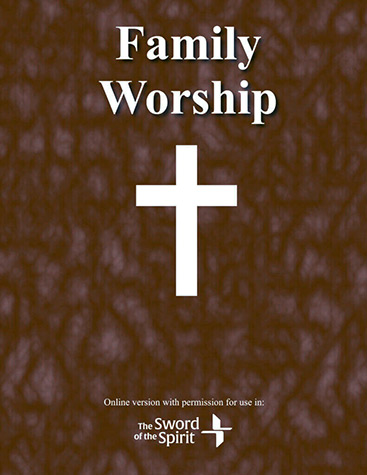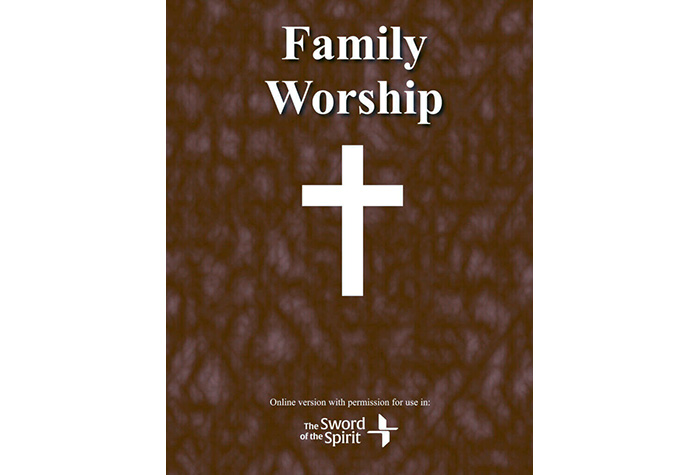Daily Prayer and Scripture
Just as an individual Christian needs to come before the Lord daily in prayer, so a Christian family needs to come before the Lord daily with its praises, thanksgiving, and petitions. And just as an individual Christian needs to read and study Scripture, so a Christian family needs to build its common life on God’s holy Word. Our daily prayer and study as individuals and as families honors God as the one who has created and redeemed us and fosters the life of God that is within us and among us.
Each family must discover the precise pattern that will work best for its own life together. Some families find that common prayer twice per day is practically feasible and spiritually advantageous. This pattern is in accord with the earliest Christian tradition of common prayer (corresponding, as in the Jewish tradition, with the two sacrifices offered daily in the temple –see Numbers 28:3-8). Other families find that they are only able to gather for prayer once per day. Each family must determine which pattern is most advisable for its life.
For most families the best time for a longer and more serious time of prayer and reading is in connection with the dinner hour. Some families find that the time before dinner works better for them, while others find that the time after dinner is optimal.
Reading the Bible
Some families read the Bible together as part of their family prayer time. Other families read the Bible together and discuss it at another time (e.g., having family prayers before dinner, and reading the Bible together after dinner). It is important for every family to pray and study together regularly; the precise pattern may vary from family to family, and even within one family in different phases of its life.
The way each family approaches the reading and discussion of Scripture will certainly vary according to the number and age of its children. At one point, it might be best to simply read Bible stories from a children’s Bible. At a later point, the children will be ready for a more adult reading and discussion.
Given this necessary diversity, are there some things that we can all do? The answer is, yes, by the grace of God! We can all seek to pray daily as families. We can all seek to read Scripture daily as families. Beyond these basics, we can also all seek to incorporate the Psalms into our prayer.
Praying the Psalms
The Book of Psalms is the Bible’s own inspired prayer book, so when we pray the Psalms we know that we are praying according to the mind of God!
Praying the Psalms works best if you read them together as a family rather than having one person read and the others listen. Therefore, you need to decide on a common translation of the Psalms, and all the readers in your family need to have their own copy. Each psalm can be read together in its entirety, or you can read it antiphonally (dividing into two groups, and alternating by verse). Another method (that can also work with pre-readers) is to select a verse of the psalm as an antiphon and then repeat that verse corporately after every stanza of the psalm, while the psalm itself is read by one person.
Some of the psalms are quite long. Therefore, in the family psalm sequence, the longest psalms are broken into two parts. However, some of the psalms and even half a psalm may still be too long for your family. If this is the case, it is fine to decide to only pray a certain section of the psalm. (This means that with longer psalms you will want to read the psalm in advance in order to pick a suitable breaking point.)
AN ORDER FOR DAILY PRAYER
The following is a recommended order of prayer. It can be varied according to time constraints and age of children, but the basic pattern is quite simple and can easily be adapted by most families. It goes as follows:
1. Call to Prayer
LEADER: O Lord, open my lips,
GROUP: And my mouth shall declare your praise.2. Chorus or Song
3. Psalm
4. Scripture Reading (if the reading will be done in this context)
5. Chorus or Song
This is especially appropriate if you will be taking the following period of extemporaneous prayer for charismatic worship (otherwise, you might want to exclude this second chorus/song)6. Extemporaneous Prayer (Petition, thanksgiving, or praise)
7. The Lord’s Prayer
POSTURE FOR PRAYER
It is best to stand for at least the first three sections of prayer (and perhaps for the entire prayer time, if there is no lengthy Scripture discussion). Standing is the main posture for prayer found in the Bible and expresses our attentiveness as servants of the King of kings.

Pattern for Daily Family Prayer is excerpted from the Family Worship book edited by Jim Berlucchi and Mark Kinzer, reprinted by the Sword of the Spirit in 2004.
The book is available online in PDF format and can be downloaded as well from the Sword of the Spirit website.
Contents for the Family Worship Book
Part I: Daily Family Prayer
- Pattern for Daily Family Prayer / 9
- Family Psalm Sequence / 12
- Prayer for God’s People / 19
Part II: the Lord’s day celebration
- An Introduction to Celebrating The Lord’ Day / 22
- The Lord’s Day Celebration / 26
- Closing Ceremony for Sunday Evening / 34
Part III: Weekday Prayers for Special Seasons
- Advent Prayers / 39
- Christmas Week Prayer / 48
- Good Friday Prayer / 49
- Easter Week Prayers / 51
Part IV: Family Ceremonies for the Christian Feasts
- Christmas Eve / 55
- Christmas Day / 61
- Epiphany Saturday / 66
- Easter Sunday / 73
- Closing The Lord’s Day of Easter Week / 78
- Pentecost / 83
Part v: Christian Passover Service
- Instructions / 91
- Outline / 98
- Christian Passover Service / 100
Dr. Mark Kinzer is Senior Scholar and President Emeritus of Messianic Jewish Theological Institute, a graduate school preparing leaders for service in the Messianic Jewish movement. Dr. Kinzer lives with his wife, Roslyn, in Ann Arbor, Michigan, where he also serves as Rabbi Emeritus of Congregation Zera Avraham, a Messianic Jewish synagogue which he founded in 1993.
He has been involved in ecumenical work since the 1970s, and has been a member of the Messianic Jewish – Roman Catholic Dialogue Group since its inception in 2000. He had an active teaching and leadership role for some 20 years (1970’s – 80’s) with The Word of God and the Servants of the Word in Ann Arbor, Michigan, USA and also with the wider network of international communities, called Sword of the Spirit. At its peak growth of 1400 people in the 1980s, The Word of God community comprised a diverse membership of Christians from many different traditions and denominations, including Catholics, Protestants, Orthodox, Pentecostals, and Messianic Jews.
Dr. Kinzer has written a number of articles and books, including Living With a Clear Conscience: A Christian Strategy for Overcoming Guilt and Self-Condemnation (1982), and Searching Her Own Mystery: Nostra Aetate, the Jewish People, and the Identity of the Church (2015), with a forward by Christoph Cardinal Schonborn, and Jerusalem Crucified, Jerusalem Risen: The Resurrected Messiah, the Jewish People, and the Land of Promise (2018).
Jim Berlucchi is the Executive Director at Spitzer Center for Ethical Leadership. He formerly served as the Executive Director of Legatus, an international association of Catholic CEOs. He served for many years as a community leader in The Word of God and The Sword of the Spirit. He and his wife Judy reside in Dexter, Michigan, USA. They are the grateful parents of eight children and enjoy a steadily increasing number of grandchildren.



